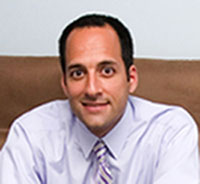USF hosts Obsessive Compulsive Foundation training program
USF Health clinical psychologist Eric Storch co-leads the program focusing on cognitive-behavioral therapy
Top experts in diagnosing and treating Obsessive Compulsive Disorder come to the University of South Florida in St. Petersburg this weekend, March 6-8, for a unique training program.
Some 30 mental health professionals, doctors and university graduate students will immerse themselves in a three-day intensive training program hosted by the Obsessive Compulsive Foundation. The program is the only one of its kind to provide thorough, comprehensive, certified training at little cost to the participants.
Leading the training are Dr. Alec Pollard, Founder and Director of the Saint Louis Behavioral Medicine Institute Anxiety Disorders Center, and Dr. Eric Storch, Associate Professor of Clinical Psychology in the Departments of Pediatrics and Psychiatry at the University of South Florida. Dr. Storch specializes in the cognitive behavioral treatment of adult and childhood obsessive compulsive disorder (OCD), as well as other obsessive-compulsive spectrum disorders and anxiety disorders. Dr. Tanya Murphy, professor and Rothman Endowed Chair of Developmental Pediatrics at USF, is also among the program’s distinguished faculty.
The Obsessive Compulsive Foundation’s Behavior Therapy Institute (BTI) supplements where traditional psychotherapy training lacks. Because there are so few trained OCD experts, it takes an average of 14 to 17 years for an OCD sufferer to receive proper treatment. That means years of life-altering debilitation, fear and anxiety due to the complicated aspects of Obsessive Compulsive Disorder.
“Patients are suffering trying to find effective treatment. It’s a devastating illness,” said Jeff Szymanski, OCF executive director. “Yet there is effective treatment. We need to increase our ability to help patients find treatment, reduce the stigma about OCD and get these patients contributing to society again.”

Eric Storch, PhD
The team at the USF Health Rothman Center of Neuropsychiatry has extensive experience using intensive outpatient cognitive-behavioral therapy to help reduce or eliminate obsessions and compulsions. Cognitive-behavioral therapy safely and incrementally exposes patients to doses of what they fear to help prevent a compulsive response.
“Our research has shown that behavior-cognitive therapy is associated with an 85 percent response rate in children and adults with OCD,” said Dr. Storch, whose work has been supported by the Obsessive Compulsive Foundation. “However, dissemination of this treatment remains very limited, and results in many people not receiving appropriate, evidence-based care, as well as considerable functional impairments.”
The program will be held at the USF Education & Conference Center in St. Petersburg. The BTIs are held just three times each year, in different parts of the country.
In the past 15 years, the Obsessive Compulsive Foundation’s BTIs have trained more than 450 professionals to identify OCD and then design and implement proven exposure response prevention therapies.
“The Behavior Therapy Institute was developed to help address the shortage of therapists properly trained in the cognitive behavioral treatment of OCD,” Pollard said. “This is a training model that is intensive, comprehensive and clinically useful, but is also more accessible than long-term fellowships and externships.”
The three-day training includes real-life case studies, small student to faculty ratios and several follow up correspondence. After completing the requirements, students earn a certificate and are added to the OCF resource list accessible to OCD sufferers and referral services.
OCD affects more than 3 million Americans and is most often begins in adolescents and young adults, though often is undiagnosed for years.
The Obsessive Compulsive Foundation is the foremost resource about Obsessive Compulsive Disorder (OCD) and related illnesses. It is an international organization that exists to raise awareness among policy makers and the general public about OCD, educate the mental health community about the latest treatments and research, connect people suffering from OCD with treatment providers, and advance research for more effective treatments. For more information about the OCF, visit www.ocfoundation.org.

